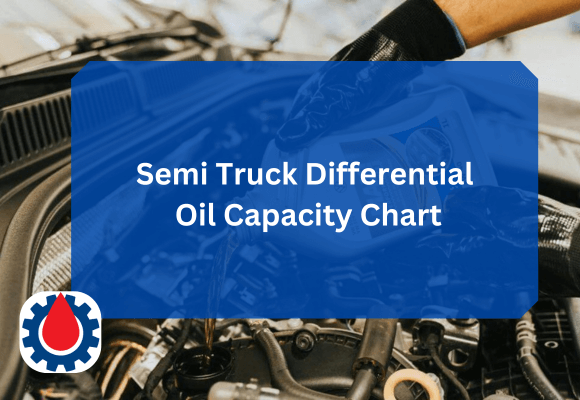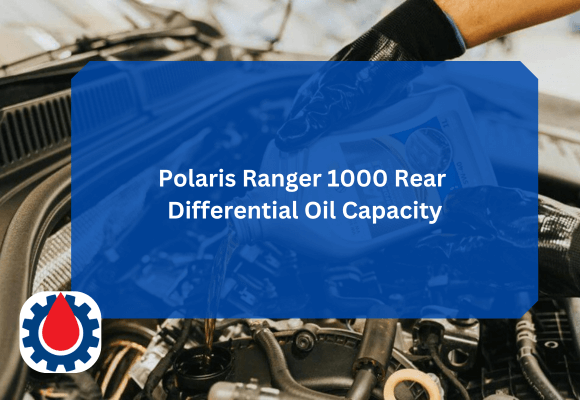The differential oil, also called gear oil, helps reduce friction, dissipate heat, and protect gears from wear and corrosion.
In this post, we’ll cover everything you need to know about semi truck differential oil capacity, including a detailed capacity chart for popular models and manufacturers.
Semi Truck Differential Oil Capacity Chart
Freightliner
| Truck Model / Axle Type | Differential Type | Oil Capacity (Quarts) | Oil Capacity (Liters) |
|---|---|---|---|
| Cascadia (Meritor RT-40-145) | Tandem Rear Axle | 37 – 40 | 35 – 38 |
| Columbia (Dana Spicer DSP41) | Single Rear Axle | 18 – 20 | 17 – 19 |
| Coronado (Eaton 46160) | Tandem Rear Axle | 39 – 42 | 37 – 40 |
| M2 106 (Dana S23-170) | Single Rear Axle | 22 – 24 | 21 – 23 |
| 122SD (Meritor RT-46-160) | Tandem Rear Axle | 40 – 44 | 38 – 42 |
| Classic XL (Eaton DS404) | Tandem Rear Axle | 38 – 41 | 36 – 39 |
| FLD120 (Meritor RT-40-145) | Tandem Rear Axle | 37 – 40 | 35 – 38 |
| Business Class M2 (Meritor RS-21-145) | Single Rear Axle | 20 – 22 | 19 – 21 |
| Century Class (Dana D40-145) | Tandem Rear Axle | 36 – 38 | 34 – 36 |
Related Truck Engine Oil Capacity Chart(For All Models)
Kenworth
| Truck Model / Axle Type | Differential Type | Oil Capacity (Quarts) | Oil Capacity (Liters) |
|---|---|---|---|
| T680 (Eaton DS404) | Tandem Rear Axle | 38 – 40 | 36 – 38 |
| W900 (Meritor RT-46-160) | Tandem Rear Axle | 40 – 44 | 38 – 42 |
| T880 (Meritor RT-46-164) | Tandem Rear Axle | 42 – 44 | 40 – 42 |
| T800 (Dana D46-170) | Tandem Rear Axle | 41 – 43 | 39 – 41 |
| T600 (Eaton DS402) | Tandem Rear Axle | 37 – 39 | 35 – 37 |
| T660 (Eaton DS404) | Tandem Rear Axle | 38 – 40 | 36 – 38 |
| T270 (Dana S14-110) | Single Rear Axle | 18 – 20 | 17 – 19 |
Related Peterbilt Engine Oil Capacity Chart(For ALL Models)
Peterbilt
| Truck Model / Axle Type | Differential Type | Oil Capacity (Quarts) | Oil Capacity (Liters) |
|---|---|---|---|
| 579 (Eaton RS404) | Tandem Rear Axle | 38 – 40 | 36 – 38 |
| 389 (Dana D46-170HP) | Heavy-Duty Rear Axle | 42 – 45 | 40 – 43 |
| 567 (Meritor RT-46-160) | Tandem Rear Axle | 39 – 42 | 37 – 40 |
| 389X (Dana D52-190) | Heavy-Duty Tandem | 43 – 46 | 41 – 44 |
| 386 (Dana D40-145) | Tandem Rear Axle | 36 – 38 | 34 – 36 |
| 365 (Meritor RS-21-145) | Single Rear Axle | 20 – 22 | 19 – 21 |
| 520 (Dana S23-170) | Single Rear Axle | 22 – 24 | 21 – 23 |
Related Volvo Engine Oil Capacity Chart(For ALL Models)
Volvo
| Truck Model / Axle Type | Differential Type | Oil Capacity (Quarts) | Oil Capacity (Liters) |
|---|---|---|---|
| VNL 760 (Meritor MT-40-14X) | Tandem Rear Axle | 38 – 41 | 36 – 39 |
| VNR 640 (Dana D40-145) | Tandem Rear Axle | 36 – 38 | 34 – 36 |
| VNX 860 (Dana D46-170HP) | Heavy-Duty Rear Axle | 43 – 45 | 41 – 43 |
| VNM (Eaton 19060S) | Single Drive Axle | 20 – 22 | 19 – 21 |
| VNL 670 (Meritor MT-40-14X) | Tandem Rear Axle | 38 – 41 | 36 – 39 |
| VNL 300 (Eaton DS404) | Tandem Rear Axle | 38 – 40 | 36 – 38 |
| VHD (Meritor RT-40-145) | Tandem Rear Axle | 37 – 40 | 35 – 38 |
Related Mack Engine Oil Capacity Chart(For ALL Models)
Mack
| Truck Model / Axle Type | Differential Type | Oil Capacity (Quarts) | Oil Capacity (Liters) |
|---|---|---|---|
| Anthem (Meritor RT-46-160) | Tandem Rear Axle | 40 – 42 | 38 – 40 |
| Granite (Mack 200 Series Axle) | Single Drive Axle | 22 – 24 | 21 – 23 |
| Pinnacle (Meritor RT-40-145) | Tandem Rear Axle | 37 – 40 | 35 – 38 |
| CHU613 (Mack 460 Series Axle) | Tandem Rear Axle | 41 – 44 | 39 – 42 |
| Vision (Mack 200 Series Axle) | Single Rear Axle | 22 – 24 | 21 – 23 |
| LR (Mack 200 Series) | Tandem Rear Axle | 34 – 36 | 32 – 34 |
| TerraPro (Mack 300 Series Axle) | Tandem Rear Axle | 36 – 38 | 34 – 36 |
Related Western Star Engine Oil Capacity Chart(For All Models)
International
| Truck Model / Axle Type | Differential Type | Oil Capacity (Quarts) | Oil Capacity (Liters) |
|---|---|---|---|
| LT625 (Dana D40-170) | Tandem Rear Axle | 38 – 40 | 36 – 38 |
| ProStar (Eaton DS404) | Tandem Rear Axle | 38 – 40 | 36 – 38 |
| Lonestar (Dana D46-170HP) | Heavy-Duty Rear Axle | 41 – 44 | 39 – 42 |
| HX620 (Meritor RT-46-164) | Tandem Rear Axle | 42 – 44 | 40 – 42 |
| 9900i (Eaton RS404) | Tandem Rear Axle | 38 – 40 | 36 – 38 |
| MV Series (Dana S13-170) | Single Rear Axle | 20 – 22 | 19 – 21 |
| CV Series (Dana S16-130) | Single Rear Axle | 18 – 20 | 17 – 19 |
| Durastar (Meritor RS-21-145) | Single Rear Axle | 20 – 22 | 19 – 21 |
Western Star
| Truck Model / Axle Type | Differential Type | Oil Capacity (Quarts) | Oil Capacity (Liters) |
|---|---|---|---|
| 5700XE (Meritor RT-46-160) | Tandem Rear Axle | 40 – 42 | 38 – 40 |
| 4900 (Eaton RS404) | Tandem Rear Axle | 39 – 42 | 37 – 40 |
| 49X (Meritor RT-46-164) | Tandem Rear Axle | 42 – 44 | 40 – 42 |
| 4700 (Dana D40-145) | Tandem Rear Axle | 36 – 38 | 34 – 36 |
| 6900XD (Meritor RT-50-160) | Heavy-Duty Tandem | 44 – 46 | 42 – 44 |
Related Isuzu Engine Oil Capacity Chart(For ALL Models)
Isuzu
| Truck Model / Axle Type | Differential Type | Oil Capacity (Quarts) | Oil Capacity (Liters) |
|---|---|---|---|
| NPR (Isuzu R040) | Single Rear Axle | 7 – 8 | 6.6 – 7.6 |
| NRR (Isuzu R066) | Single Rear Axle | 8 – 9 | 7.6 – 8.5 |
| FTR (Dana S150-S) | Single Rear Axle | 14 – 16 | 13.2 – 15.1 |
| FVR (Dana S190) | Single Rear Axle | 16 – 18 | 15.1 – 17 |
Hino
| Truck Model / Axle Type | Differential Type | Oil Capacity (Quarts) | Oil Capacity (Liters) |
|---|---|---|---|
| 268 (Meritor RS-21-145) | Single Rear Axle | 20 – 22 | 19 – 21 |
| 338 (Meritor RS-23-160) | Single Rear Axle | 22 – 24 | 21 – 23 |
| L6 Series (Dana S16-130) | Single Rear Axle | 18 – 20 | 17 – 19 |
| XL8 (Meritor RT-40-145) | Tandem Rear Axle | 37 – 40 | 35 – 38 |
Related Oil Leak Between Engine and Gearbox(5 Causes + Solutions)
How to Check Differential Oil Level
To maintain optimal performance, check your differential oil regularly, every 25,000 to 50,000 miles (or during each major service interval).
Steps:
- Park on level ground and engage the parking brake.
- Locate the differential fill plug (usually halfway up the housing).
- Remove the plug and check oil level, it should be just below the hole’s edge.
- If low, top up with the manufacturer-recommended oil.
- Reinstall the plug securely.
Differential Oil Change Interval
For synthetic gear oils, change intervals can range from 250,000 to 500,000 miles, depending on load and driving conditions. Conventional oils may require more frequent changes (around 100,000 to 150,000 miles).
Truck fleets operating under severe or dusty conditions should shorten intervals to ensure protection.
Related Exmark Premium Hydro Oil Equivalent(Top 5 Best 2025)
Best Practices for Differential Maintenance
- Inspect regularly for leaks around axle seals or differential covers.
- Avoid overfilling – too much oil causes foaming and heat buildup.
- Use synthetic oil for extended drain intervals and better thermal stability.
- Change both axles simultaneously on tandem-drive trucks to maintain balance.
- Keep vent tubes clear to prevent pressure buildup inside the housing.
Using synthetic 75W-90 or 75W-140 oil significantly improves differential efficiency and fuel economy. These oils perform consistently across extreme temperature variations and provide better oxidation resistance, making them ideal for long-haul trucking – Editor, EOJ
FAQs
How much oil does a semi truck rear differential hold?
Most semi truck rear differentials hold between 38 and 45 quarts of gear oil, depending on the make and axle configuration. For instance, tandem-drive axles such as the Meritor RT-46 or Eaton DS404 typically require around 40 quarts (38 liters), while single axles may need only 18–24 quarts (17–23 liters). Always check your truck’s manual or the axle tag for exact specifications.
How many litres of oil does a diff take?
A typical semi truck differential takes around 35 to 45 liters of oil for a tandem axle setup and about 18 to 23 liters for a single rear axle. Heavy-duty axles like the Dana D46-170HP or Meritor RT-46-164 may hold slightly more, especially in high-capacity long-haul trucks.
How many liters of gear oil to be fill in a differential?
It depends on the axle type and configuration:
- Single rear differential: 17–23 liters
- Tandem rear differential: 36–42 liters
- Heavy-duty or off-road axles: Up to 45 liters
- When filling, the oil should reach just below the fill plug hole, ensuring proper lubrication without overfilling.
How much oil goes in a semi truck?
A semi truck’s total oil capacity includes both engine oil and differential oil. The engine typically holds 35–45 quarts (33–43 liters), while the differentials together (front and rear) can hold 70–90 quarts (66–85 liters) combined in tandem-drive setups. This can vary by brand, model year, and engine type.
How to check differential oil on semi truck?
Checking differential oil on a semi truck is simple but important:
- Park on level ground and apply the parking brake.
- Locate the fill plug on the differential housing (usually halfway up).
- Remove the plug and check if the oil level is just below the bottom of the hole.
- If the oil is low or dirty, top it up or replace it as recommended.
- Reinstall the plug tightly and clean the surrounding area to prevent leaks.




